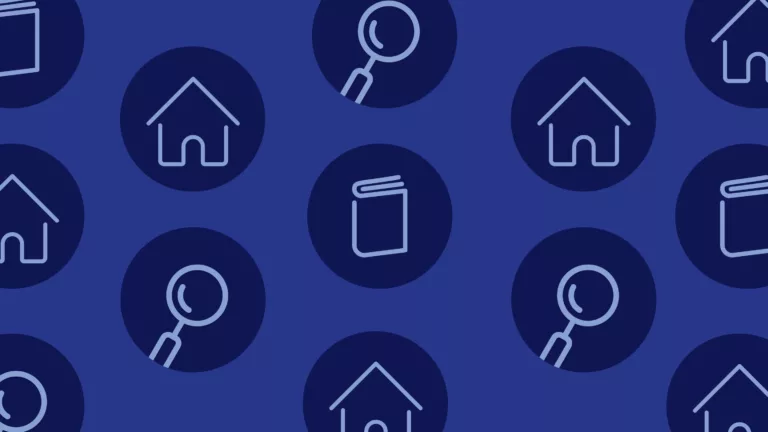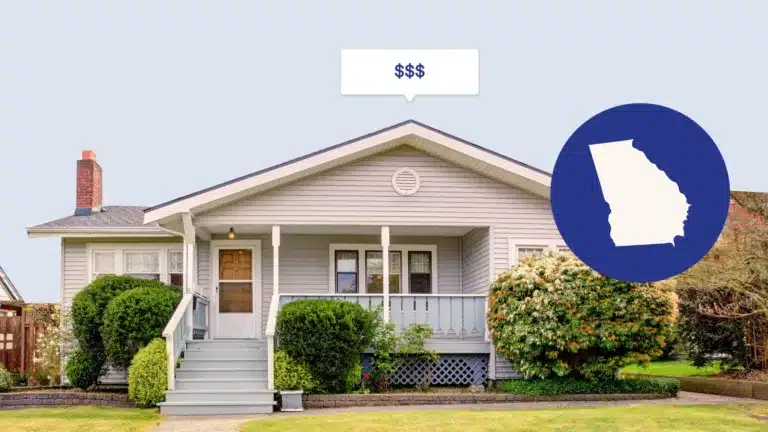When buying a home, one of your first thoughts probably turns to the following question: “How much house can I afford?”
You may wonder how large of a house you should and can purchase (especially when buying your first home). It’s one of the most important questions you can ask, because you want to feel as comfortable with your monthly mortgage payments as possible early on and up to as many as 30 years. (You might not want to have to consider refinancing your mortgage right away!)
Let’s dive into some tips and tricks to help you fully understand how to figure out how much house you can afford.
How Much House Can I Afford?
It’s often easiest to learn how much house you can afford by working backward from your monthly expenses, then determining how much you can afford to pay. In other words, add up your current monthly expenses and subtract them from your monthly income. How much money do you have left over for a mortgage payment?
Morty’s personalized Loan Options can quickly show you how much you may want to consider spending on a home. Once you create a login on Morty’s site, you can access Morty’s home affordability calculator.
Some key factors end up going into the picture, including the following:
- Monthly income: How much gross monthly income do you bring in per month? Gross monthly income refers to your earnings before taxes. (Your disposable/net income refers to what you can actually spend on a monthly basis — it’s your after tax money.) Consider side hustles and other income, such as freelance earnings as well. Some experts recommend spending no more than 28% of your income on monthly mortgage payments.
- Total monthly debts: Your monthly debts will also factor into how much you can afford to pay each month. How much do you spend on car loans and/or student loan payments, debt from credit cards and other debts?
- Expenses: What recurring monthly expenses do you have? Consider everything from your life insurance premium to club soccer fees for your kids.
- Cash reserves to cover your down payment and closing costs: You’ll need to pay closing costs and in most cases, a down payment (however, some types of mortgage loans allow you to skip the down payment). Also, keep in mind that you don’t have to have a 20% down payment — it’s a common misconception. Many mortgage lenders allow borrowers to get a conventional loan with only 3% down. Your down payment will depend on your specific situation and the amount you’d like to put down.
- Your credit profile: Your credit profile has an impact on how much home you can qualify for. The higher your credit score, the more likely you’ll qualify for a lower interest rate. The lower your credit score, the more likely you’ll have to pay more for your monthly mortgage payments because your lender may give you a higher interest rate.
- Debt-to-income ratio: Your debt-to-income ratio (DTI) involves the amount of money you spend compared to how much money you make. The lower your debt-to-income ratio, the more likely you’ll receive favorable terms from your lender. Most experts recommend shooting for a 36% DTI.
It’s also important to remember that unexpected expenses pop up. Your car might suddenly go on the fritz and you may need to purchase a new one, for example. That’s why it’s important to consider building up your emergency fund (at least three to six months’ worth of expenses) so you can cover your mortgage payment if something unexpected happens.
How Much House Can I Afford with an FHA Loan?
First of all, FHA loans are loans backed by the Federal Housing Administration, an agency under the Department of Housing and Urban Development. “Backed” simply means that the FHA insures these loans and protects your lender against losses if you stop making your mortgage payments.
There’s no magic answer for how much you personally can afford with an FHA loan. The amount you can afford depends on the factors we discussed above — your personal income, debts, expenses, credit profile and DTI. You must make a minimum 3.5% down payment if you have a 500 credit score or higher.
However, the Department of Housing and Urban Development allows FHA lending amounts up to a certain maximum. For example, in high-cost areas (such as New York City and Los Angeles) the 2022 limit goes up to $970,800. In lower-cost areas, the FHA limit can go as low as $420,680.
Take a look at the FHA mortgage limits page to learn about the limits in your area. The page also includes a median sale price value for each area, which HUD uses for loan limit determination.
How Much House Can I Afford with a VA Loan?
VA loans, backed by the government through the Department of Veterans Affairs, allow eligible service members, veterans and eligible surviving spouses to get a mortgage loan.
Again, you must consider your personal circumstances and financial situation before you decide how much house you can afford with a VA loan.
Ultimately, you can borrow as much as you want up to the VA’s guarantee. The loan limit amounts to $647,200 for most counties in the U.S. in 2022, increasing from $548,250 in 2021.
You don’t have to make a down payment for a VA loan, though your lender may have specific requirements if you choose to go the no-down-payment route. However, you will pay a funding fee, which ranges from 1.4% to 2.3%.
Finding the Right Home for Your Needs and Budget
When you daydream about your perfect home, what tops the list? A kitchen with all the bells and whistles? A spacious master suite? A pool in the backyard? Make a list of “must haves” before you shop.
Next, research the area and find potential homes for sale. Use a real estate agent to help you find homes to match your budget. Don’t even look at homes that you know will soar over your budget — you may not want to tempt yourself!
Consider buying below your housing budget. With your real estate agent’s help, you may find everything you want in a house below your budget.
Let’s take a look at a few ways you can make sure your mortgage rates, purchase price and recurring house payments make sense for your needs.
Is the Mortgage Payment Affordable for You?
Everyone has a different comfort level for their monthly mortgage payment. However, how much you’ll pay depends on a number of factors, including your down payment amount, home price, interest rate, mortgage term and more. You’ll also want to carefully evaluate whether you can comfortably handle your existing debt after you take on monthly mortgage payments.
You can also consider using the 28/36 rule to help you calculate. According to this rule, your mortgage payment would not amount to more than 28% of your monthly pre-tax income and not more than 36% of your total debt.
Finally, consider two more things: Your mortgage term and private mortgage insurance (PMI). The mortgage term, or the number of years it will take you to pay off your mortgage, can also affect your mortgage payment amount, and so can PMI.
Your Mortgage Term
For example, let’s say you choose to purchase a home for $200,000. You qualify for a 4% mortgage interest rate on a 30-year mortgage. Your mortgage payments will cost $954.83 per month (without taxes and insurance included).
Now, let’s change the mortgage term. A $200,000 home at 4% interest on a 15-year mortgage will cost you $1,479.38 monthly (without taxes and insurance).
As you can see, the amount you pay for your mortgage could change dramatically, depending on the mortgage term you choose.
Private Mortgage Insurance (PMI)
You may also need to consider the cost of PMI. PMI protects your lender if you default on your loan. If you put down a down payment of less than 20% when you buy a home, your mortgage lender will require you to make PMI payments.
Once your mortgage balance reaches 78% of the original purchase price on your mortgage, you will qualify for automatic PMI cancellation. You can also request PMI removal yourself when you reach 80% of the original purchase price. You can pay down your balance in advance if you choose.
What Are the Costs?
In addition to the principal (the original amount of money you borrow) and interest that makes up the bulk of your mortgage payments, you’ll also have to pay property taxes, homeowners insurance and utilities.
- Property taxes: Property taxes are based on the assessed value of your home. A property assessor looks at your home to tell your local government how much you should pay in taxes.
- Homeowners insurance: You’ll pay for homeowners insurance on top of your property taxes. Your lender may put both insurance and taxes in escrow — a specific account used to pay these fees. You can choose your homeowners insurance company. Make sure to talk to an agent so you get the right amount of coverage for your home.
- Utilities: How much will you pay in utility bills? This can be hard to determine ahead of time because you won’t know how much water you’ll use on a monthly basis in your new home, for example. However, you can call local utility companies to get an idea of how much you’ll likely pay.
Check into available tax incentives, such as credits for residential energy efficiency, deductions on the principal amount of your mortgage payments, property tax deductions and more. Talk with a tax professional for more information.
Determine How Much Home You Can Afford Ahead of Time
You want to do some careful calculations before you start house hunting. After all, the costs include more than just dividing your purchase price by your mortgage term. You’ll want to consider how much money you and your family bring to the table each month, plus your expenses and debts.
Consider your cash reserves for a down payment, closing costs and other personal factors that may influence your mortgage payments, including your credit profile and DTI. You’ll also need to consider extra expenses such as property taxes, homeowners insurance and utility costs.
Looking for more information from Morty? Learn more about investment property mortgages.
This post was updated on Feb. 20, 2022 to reflect 2022 FHA and VA loan limits.






